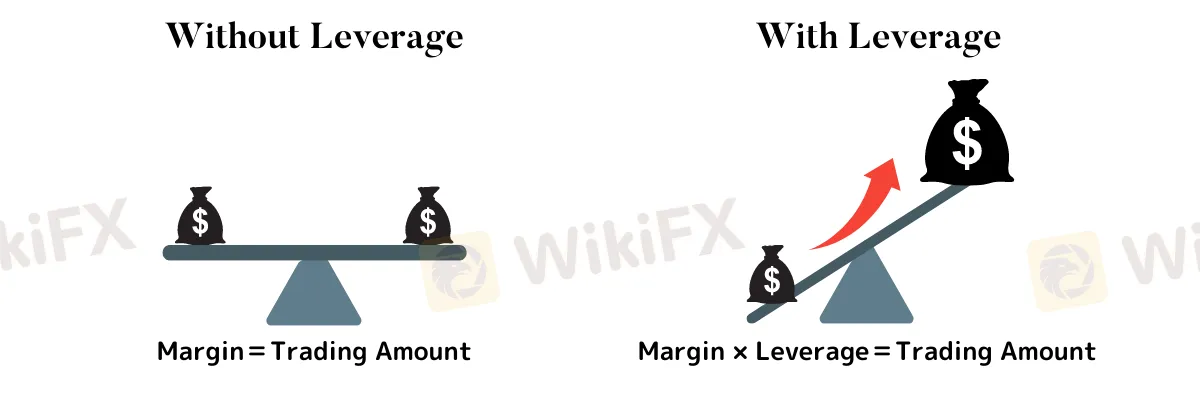简体中文
繁體中文
English
Pусский
日本語
ภาษาไทย
Tiếng Việt
Bahasa Indonesia
Español
हिन्दी
Filippiiniläinen
Français
Deutsch
Português
Türkçe
한국어
العربية
Starting Forex Trading: What is Leverage and Margin?
Abstract:Leverage can greatly amplify profits and losses as merchants can control larger positions using less money (margin). Leverage transactions are also called margin transactions.

Leverage will amplify potential gains and losses. For example, if you purchase EUR/USD at 1.0000 without leverage, the price will be zero or you will have to double your investment by moving to 2.0000 to bear the total loss. When trading using a total of 100:1 leverage, 100 times less price fluctuations result in the same profit or loss.
Margin is the capital that traders have to raise to open a new position. It is not a fee or cost, and it will be canceled again when the transaction is terminated. The purpose is to protect brokers from losses. If the traders margin falls below a predefined stop-out percentage due to loss, one or all open positions are automatically closed by the broker. The margin call warning from the broker is a warning message that additional deposits are needed in the transaction account to prevent the shortage of evidence needed to maintain the open position.
How leverage and margin works.
With 100:1 leverage, merchants can open positions 100 times larger than they can without leverage. For example, if the purchase cost of EUR/USDs 0.01 litres is generally $1000 and the broker offers 100:1 leverage, the trader must raise it to $100,000. Of course, merchants can use as little leverage as they want.
Caution: The higher the leverage, the higher the risk. Most experts use very low leverage ratios or do not use them at all and use the appropriate risk ratio per transaction.
For more information on leverage, please read the article on what leverage is and how to use it in Forex.
Use a convenient foreign exchange margin calculator to calculate margin requirements based on transaction size and leverage.

Disclaimer:
The views in this article only represent the author's personal views, and do not constitute investment advice on this platform. This platform does not guarantee the accuracy, completeness and timeliness of the information in the article, and will not be liable for any loss caused by the use of or reliance on the information in the article.
Read more

What Euro Investors Can't Afford to Miss
For euro investors, geopolitical factors, inflation data, and the European Central Bank's policy direction will determine the market trends over the next few months.

How Big is the Impact of the USD-JPY Rate Gap on the Yen?
The U.S. Federal Reserve's repeated rate cuts and the narrowing of the U.S.-Japan interest rate differential are now in sight. So, why is the U.S.-Japan interest rate differential so important for the yen’s safe-haven appeal, especially when global economic uncertainty rises?

Malaysian Man Killed in Alleged Forex Dispute-Related Attack
A 44-year-old Malaysian businessman, Wong Kai Lai, died after being attacked by about 20 men in Jenjarom, Kuala Langat, on 19 December. Police believe the attack may have been linked to a foreign currency exchange dispute.

Turkey Resumes Rate Cuts Amid Easing Inflation
Turkey’s inflation has eased, prompting the central bank to resume interest rate cuts. Striking a balance between economic recovery and inflation control has become a critical focus. However, significant challenges lie ahead, as Turkey continues to navigate complex economic conditions.
WikiFX Broker
Latest News
Will Gold Break $2,625 Amid Fed Caution and Geopolitical Risks?
ECB Targets 2% Inflation as Medium-Term Goal
New Year, New Surge: Will Oil Prices Keep Rising?
PH SEC Issues Crypto Guidelines for Crypto-Asset Service Providers
FTX Chapter 11 Restructuring Plan Activated: $16 Billion to Be Distributed
Bithumb CEO Jailed and Fined Over Bribery Scheme in Token Listing Process
WikiFX Review: Something You Need to Know About Saxo
Is PGM Broker Reliable? Full Review
Terraform Labs Co-founder Do Kwon Extradited to the U.S. to Face Fraud Charges
Has the Yen Lost Its Safe-Haven Status?
Currency Calculator






